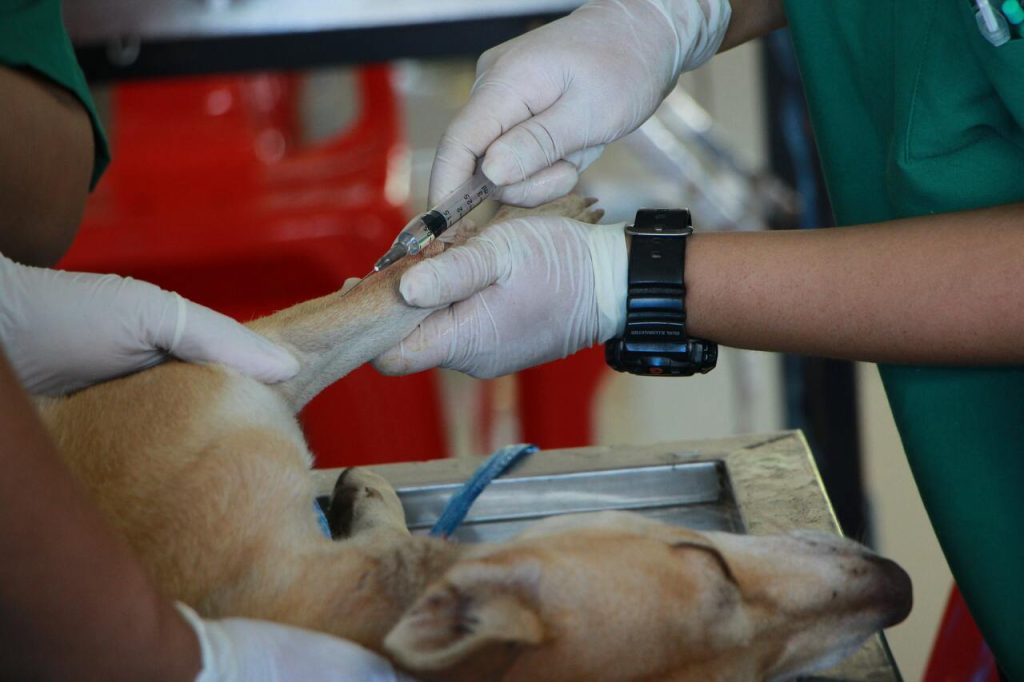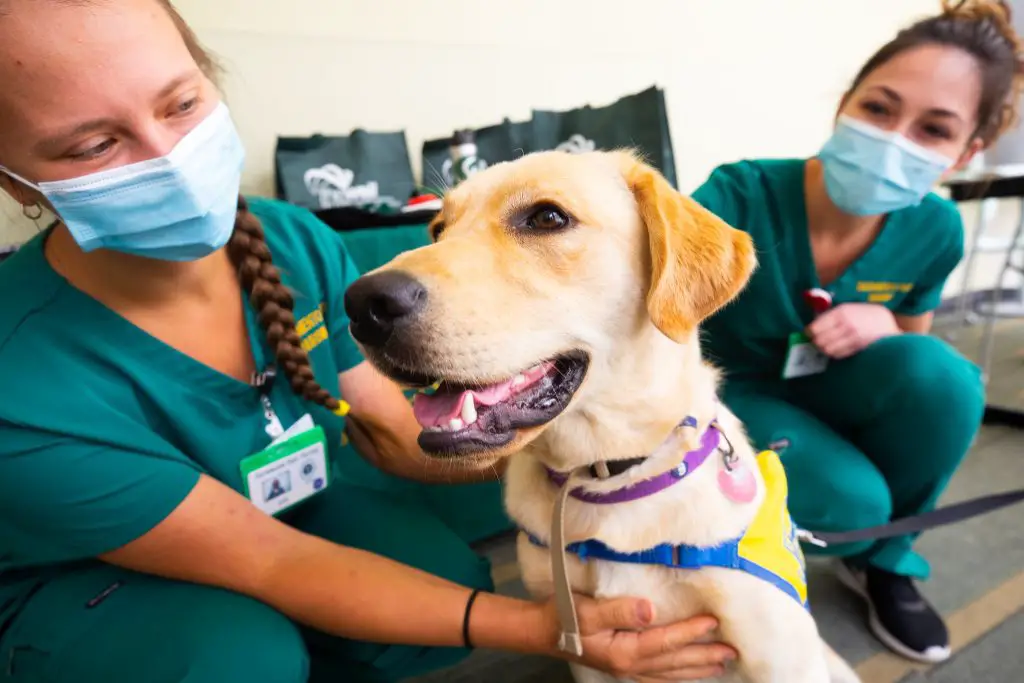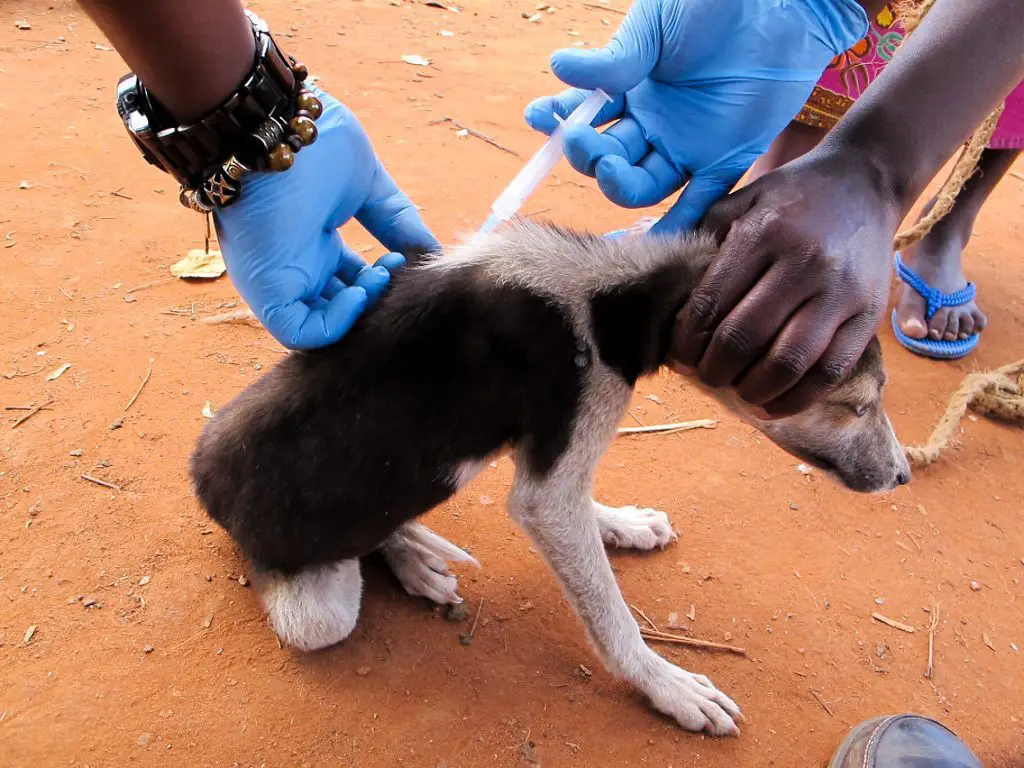If you for whatever reason didn’t vaccinate your dog, or you rescued an unvaccinated dog, you may wonder if it’s too late to vaccinate your dog.
Vaccinations are one of the most important things you can do for your pet.
They help protect your dog from dangerous diseases and illnesses, and they’re essential for keeping him healthy and safe. But, is there such a thing as being too late for vaccination?
In this blog post, we’ll discuss the importance of vaccinations and answer some common questions about them. We’ll also provide a list of recommended vaccines for dogs.
So if you’re wondering whether or not is too late to vaccinate your pup, read on!
Key Takeaway
- It is never too late to vaccinate your dog, as vaccinations can be administered at any age to protect against various diseases unless the dog already has the disease you are trying to prevent.
- A dog’s vaccine can technically be delayed without immediate harm, but it’s generally recommended not to postpone more than a few weeks from the due date to maintain optimal protection against diseases.
- There is no age limit for vaccinating dogs, and even senior dogs can receive vaccinations as their immune systems are typically capable of responding to them effectively.
Is It Too Late To Vaccinate My Dog?

It is never too late to vaccinate your dog. There is no such thing as too late to vaccinate your dog. Vaccinations are one of the simplest and most effective ways to protect your pet from deadly diseases. They help build immunity by stimulating the production of antibodies.
Puppies should start their vaccinations as early as six weeks old, but even an adult dog can benefit from them. So if you haven’t vaccinated your furry friend yet, there’s no need to worry. Just make an appointment with your veterinarian and get it done ASAP!
There are a variety of vaccines available for dogs, depending on their age, lifestyle, and health condition. The most common ones are against rabies, distemper, hepatitis, and parvo.
Vaccines help prevent disease by protecting your dog from viruses and bacteria. They work by injecting a “dead” or “modified live” form of the virus into your dog’s body.
As your dog’s immune system fights off the “dead” virus, it also becomes primed to recognize and fight the live, or active, form of the virus if it’s ever exposed to it.
Older dogs can get vaccinated. The vaccination schedule for an older dog will be different from that of a puppy, and the types of vaccines may also be different. Your veterinarian can help you create a vaccination schedule that is right for your older dog.
There is no upper age limit for vaccinating your dog. In fact, senior dogs are more at risk of contracting certain diseases, so it’s important to keep them up-to-date on their vaccinations. The same goes for puppies – they may be small, but they’re still susceptible to disease.
What Happens If You Vaccinate Your Dog Late

If you vaccinate your dog late, their immune system might not be as active resulting in lower protection against diseases, and they might need to repeat the vaccination course, especially if the last dose was administered over 3 years ago.
When a dog’s vaccination is delayed, this can impact the effectiveness of the immune response. Vaccinations work by training the dog’s immune system to recognize and combat specific diseases.
If a vaccine booster is missed or delayed, the immune system may not be as active, which could lead to reduced protection against the disease that the vaccine is designed to prevent.
Furthermore, if the last dose of a core vaccine was given over three years ago, the dog might be considered overdue for revaccination. In such cases, it could be necessary to repeat the vaccination course that they had as a puppy, which usually involves two injections typically given 2-4 weeks apart.
If a dog’s vaccinations have lapsed, it’s important to consult with a veterinarian to determine the best course of action. Depending on the specific situation and the dog’s overall health, the vet might recommend restarting the vaccination series or administering a booster shot.
How Long Can a Dog Vaccine Be Delayed

A dog’s vaccine can generally be delayed up to three months for adult animals without significant risk, but if a puppy or kitten is more than 2 weeks late for booster vaccination, their immune system may not be as active, and this could affect their protection against diseases.
Vaccines play a crucial role in protecting dogs from various diseases. While the exact timing can depend on the type of vaccine and the dog’s age, health status, and lifestyle, it’s generally recommended to adhere to the vaccination schedule set by your vet as closely as possible.
However, if circumstances make it challenging to get the vaccine exactly on time, an adult dog might still be protected for up to three months past the due date.
For puppies and kittens, the window is much narrower. If they’re more than two weeks late for a booster vaccination, their immune response could be less active, which means they might not be as well-protected against diseases.
In such cases, they may need to restart the vaccination series to ensure optimal immunity.
Is a Dog Too Old To Get Vaccinated?
A dog is never too old to get vaccinated, as vaccinations can provide important protection against diseases even for senior dogs.
Vaccinations are a crucial part of a dog’s healthcare regimen at any age. They work by stimulating the immune system to recognize and fight specific diseases, providing your pet with a level of immunity.
While it’s true that puppies often receive a series of vaccines in their first year of life, this does not mean that older dogs do not need vaccinations.
Even senior dogs can benefit from vaccines. Their immune systems, like ours, can forget how to fight off certain diseases over time, especially if they haven’t been exposed to the disease in a while. Vaccines help to remind their immune system how to fight these diseases.
However, the specific vaccines an older dog might need can depend on their health status, lifestyle, and risk factors. Therefore, it’s important to consult with a veterinarian to determine the best vaccination schedule for your senior dog.
They can advise you on which vaccines your dog needs, and how often they should be administered to ensure your pet remains healthy and protected throughout their golden years.
Can a Dog Survive Without Vaccinations?

While it’s technically possible for a dog to survive without vaccinations, this significantly increases their risk of contracting serious, potentially fatal diseases.
Vaccinations play a fundamental role in a dog’s health by providing immunity against a range of serious diseases. While some dogs may live without vaccinations, this leaves them vulnerable to various viruses and infections.
Without the protective barrier provided by vaccinations, a dog’s immune system might not be equipped to fight off these diseases, which could lead to detrimental or even fatal outcomes.
Moreover, it’s not just about the individual dog’s health. Vaccinations also help prevent the spread of diseases to other animals in the community. For instance, if one dog contracts a contagious disease and interacts with other unvaccinated dogs, there’s a high risk of an outbreak.
Additionally, even indoor dogs need vaccinations. There’s a common misconception that dogs living indoors don’t require vaccinations, but this isn’t the case. Diseases can be brought into the home on shoes, clothes, or other pets, putting indoor dogs at risk too.
FAQs
Q: What diseases can be prevented by vaccinating my dog?
A: Vaccinating your dog can help prevent diseases such as rabies, distemper, parvovirus, hepatitis, and kennel cough.
Q: What is the recommended vaccination schedule for dogs?
A: The recommended vaccination schedule for dogs includes a series of vaccinations starting at around 6-8 weeks of age, with boosters given every 3-4 weeks until around 16 weeks of age. After the initial series, dogs typically receive booster shots annually or every three years depending on the vaccine.
Q: Is it too late to vaccinate my adult dog?
A: It is never too late to vaccinate your dog. Even if your dog has not been vaccinated in a while or has never been vaccinated, they can still benefit from vaccinations.
Q: Can my dog have an allergic reaction to vaccines?
A: While rare, dogs can have allergic reactions to vaccines. Signs of an allergic reaction may include facial swelling, hives, vomiting, diarrhea, or difficulty breathing. If you notice any of these signs after your dog receives a vaccine, contact your veterinarian immediately.
Q: Are there any side effects of vaccinating my dog?
A: Some dogs may experience mild side effects after vaccination, such as soreness at the injection site or mild lethargy. These side effects are usually temporary and resolve on their own.
Q: Can I vaccinate my pregnant dog?
A: It is generally safe to vaccinate a pregnant dog, but it is important to consult with your veterinarian to determine the best course of action.
Q: How long does the immunity from vaccines last?
A: The duration of immunity provided by vaccines can vary depending on the specific vaccine and the dog’s individual immune response. Some vaccines provide immunity for one year, while others may provide immunity for three years. Your veterinarian can provide guidance on the recommended vaccination frequency for your dog.
Q: Can I skip some vaccines if my dog rarely goes outside?
A: While the risk of exposure to certain diseases may be lower for dogs that spend most of their time indoors, it is still important to follow the recommended vaccination schedule. Diseases can be transmitted through various means, and even limited exposure can pose a risk to your dog’s health.
Q: Can my dog get vaccinated if they are sick?
A: It is generally not recommended to vaccinate a sick dog. Vaccines work by stimulating the immune system, and if the immune system is already compromised due to illness, the vaccine may not be as effective. It is best to wait until your dog has fully recovered before vaccinating them.
Conclusion and final thoughts
In conclusion, it is never too late to vaccinate your dog.
Vaccinations are an important aspect of responsible pet ownership and can help protect your furry friend from potentially life-threatening diseases.
While there may be some risks associated with vaccinations, the benefits far outweigh them.




